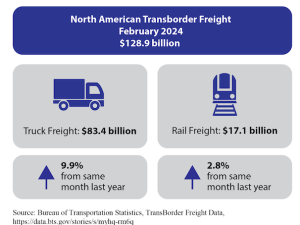State governments moved forward with nearly 111,000 new federal-aid highway and bridge projects during the past five years under the Fixing America’s Surface Transportation (FAST) Act law, new research from the American Road & Transportation Builders Association (ARTBA) shows.
“Our research illustrates tangible success stories of the federal highway program,” said ARTBA President and CEO Dave Bauer. “Such real-world project outcomes would be even more robust under the highway and transit investment bills advanced by the House and Senate in the last Congress.”
ARTBA’s compilation of Federal Highway Administration data was released to coincide with the Feb. 24 Senate Environment & Public Works Committee hearing on the reauthorization of the surface transportation program, which is due by Sept. 30.
Between fiscal year (FY) 2016 and FY 2020, states leveraged nearly $200 billion in federal funds to support over $340.5 billion in new highway and bridge program improvements, according to ARTBA Chief Economist Dr. Alison Premo Black, who prepared the report. States also used program revenues to continue to support projects already underway.
“This report highlights the benefits and value the federal highway program brings to communities all across America,” Dr. Black said. “Congress and President Biden have a unique opportunity to build on the successes of the FAST Act and make significant new infrastructure investments to fuel the nation’s post-pandemic economic recovery.”
Projects moved forward in more than 3,130 U.S. counties, boroughs, and parishes. States with the most number of projects: Texas (7,397), Indiana (6,500), Ohio (5,962), Michigan (5,715), California (5,432), New York (4,915), Illinois (4,235), Florida (4,168), Missouri (4,004), Virginia (3,626) and Tennessee (3,158).
State transportation departments prioritized major reconstruction and repair work; it accounted for an average 47 percent of the $340.5 billion investment and totaled 60,000 road and bridge projects. Eight states spent more than two-thirds of funding on major repair work, including: Alabama (76 percent), Minnesota (74 percent), Missouri (74 percent), South Dakota (71 percent), Maine (71 percent), Connecticut (70 percent), North Dakota (68 percent), Ohio (66 percent), and New Mexico (66 percent).
New capacity on existing roadways—such as widening a lane or shoulder or adding a turn lane—accounted for 19 percent of state expenditures.
Almost all of the projects—98 percent—are expected to cost less than $25 million each, averaging $1.7 million per project. Thirty-two projects in 17 states are moving forward at a cost of $500 million or more for each.
One-third of the investment, or $113 billion, was dedicated to highway and bridge projects on the Interstate Highway System, while another 30 percent, or $102 billion, went towards work on the National Highway System, Dr. Black says. Other federal-aid highways accounted for 26 percent of the total, or $90 billion.








